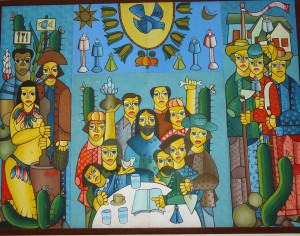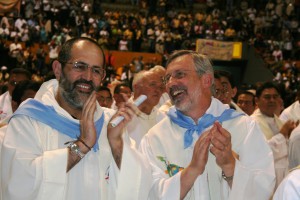A commentary on John 15, 9-17, VI Sunday of Easter, May 10th 2015
We continue Reading the gospel of John, as in previous Sundays, but this time we leave behind the allegories (the Good Shepherd, the Vine and the branches) to come to a direct and moving declaration of friendship in a circle formed by Jesus, the Father and the disciples. I invite you to read this text imagining to be there in that room “at the upper floor”, in that house in Jerusalem, where Jesus was staying with his friends, before confronting the most decisive “hour” in His life. Let us go a bit into detail:
 1.- The decisive hour, the time of truth
1.- The decisive hour, the time of truth
In chapters thirteenth to fourteenth, John tells us about Jesus’ gestures, feelings and words in those last hours of His life, when He was already aware of the deadly conflict He had with the authorities of His nation and His project of the Kingdom appeared set for a complete failure. The text we read today resounds with a special emotional energy, because what is at stake it’s not an idea or a project, but something much more relevant and “personal”: the quality of His relationships with His Father and His disciples.
In fact, that Holy Thursday was one of this crucial moments that we have in life, when we can become cowards and traitors (avoiding suffering) or reach the maximum of generosity, confirming our unconditioned faithfulness and our readiness to give up even our whole life in a supreme decision of confidence, trusting in God and in the Project (vocation) he has called us to follow. In that crucial moment, Jesus celebrates with his friends, the most important rite of His religious Tradition, the Passover, making it new and present in His own life. As the People did in Egypt, the same way Jesus prepared Himself “to pass”, in His case, “from this world to the Father”. In such a moment of supreme decision, life is played at its very essentials and Jesus thinks shows what it’s that really matters to Him.
 2.- In the end, only love matters
2.- In the end, only love matters
Jesus has shared three intense years with His disciples. Together they travelled quite a lot from Galilee to Jerusalem; together they cured sick people, announced forgiveness to sinners, ate with humble and rich people, had big arguments with Pharisees, proposed a strong moral renewal… But now, when the end is nearing, all that seems to a certain point secondary. In fact, what really matters to Jesus in those dramatic hours is what He says clearly in today’s reading: “As my Father has loved me, so have I loved you; abide in my love”.
This is the secret of His life: Jesus has no doubts, even in the most dramatic moments and sufferings, that He is loved by the Father. That is the source of His strength, serenity, and deep joy that makes Him exult before the beauty of Nature or before those simple people, to whom God reveals himself as a God of wisdom and pardon, ready to re-construct broken hearts. That is the source of His complete freedom from fanatic moral condemnations from left or from right. And Jesus shares that experience of love with His friends, even if they do on understand Him fully. As a matter of fact, they do not have to be perfect or very clever; the only thing that, at this dramatic moment, really matters is that He loves them as the Father loves Him. They are not “servants”; they are not “civil servants” of a determined political, social or even religious project; they are “friends”, more, they are “brethren”; with them He shares everything; joys and sorrows, failures and successes… and, over all, the Father’s love.
 3.- To abide
3.- To abide
To His Friends and brothers, Jesus aske sonly one thing: that the love each other and abide in His love. But this love between Jesus and His disciples is not a “cheap” feeling for superficial or “shallow” people, with no roots (like a plan in the sand). It’s rather a stout friendship, rooted in the awareness of being children of the same Father and of sharing the same project of a new humanity. It’s not a friendship of convenience (that ends when the benefices end), but a friendship that endures beyond failures and successes, a friendship that remains in time and open to all those who want to follow Jesus from whatever culture or condition. A friendship that leads to the acceptance of His mandates in a mature and concrete faithfulness. A friendship that becomes affective nearness, capacity to forgive and understand, faithfulness and so many things that we can experience in our daily lives.
A friendship we celebrate and confirm in every Eucharistic celebration; a friendship that we pray that it becomes fertile and gives is Jesus Joy and mission.
Fr. Antonio Villarino
Roma



